

What is... Stress? Stressors. Positive? or Negative? It's all up to you! Coping with stress, which type are you? Sleep-deprived Singaporean workers among most stressed globally: Survey. SINGAPORE — Singaporeans are not only sleep deprived, but they are also among the most stressed at work globally, according to a survey by health service company Cigna released on Tuesday (Mar 26).

Nearly 92 per cent of Singaporeans surveyed were stressed from work, which was higher than the global average of 84 per cent. Of this group, 13 per cent said that the stress they faced was unmanageable. Singaporeans’ physical wellness index also dipped by 4.4 percentage points from last year, which the survey attributed to an increase in sleepless nights.
Of the 23 markets surveyed, Singapore had the fifth lowest wellness index, which was measured across five key indices — family, financial, physical, social and work. Singapore fell by a place from last year as its wellness index went down by 1.7 points to 57.8. The survey collated about 13,200 responses from over 24 countries, with a sample of 502 respondents in Singapore. Read also “Vulnerability will make it seem that you are not as competent. Singaporeans are among the most stressed at work, globally. Singaporeans are among the most stressed at work, globally, the 2019 Cigna 360 Well-Being Survey – Well and Beyond has revealed.
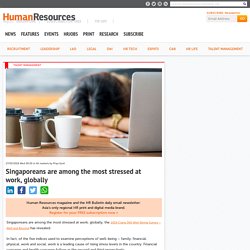
In fact, of the five indices used to examine perceptions of well-being – family, financial, physical, work and social, work is a leading cause of rising stress levels in the country. Financial concerns and health concerns follow as the second and third respectively. More importantly, the ‘always on’ corporate culture that is prevalent in Singapore is another contributor of stress, particularly among women – 71% feel they work in such a culture, as compared to 66% of men. On this, April Chang, Chief Executive Officer, Cigna Singapore, said: “A busy work life, combined with an ‘always on’ culture, is impacting the physical and social well-being of Singaporeans.
“The stigma of seeking help for mental well-being may also prevent many from pursuing professional help.” ALSO READ: Mental wellness at the workplace: It goes beyond the occasional day-off The global snapshot. Burnout likely a common problem here, Singaporeans among most stressed at work globally. SINGAPORE - When Ms Le Giang, 37, started a business selling Vietnamese street food in a kopitiam here nearly two years ago, she looked forward to being her own boss.
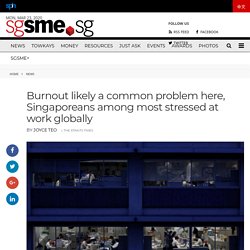
The degree holder, who was previously a regional sales manager for a multinational firm, has since realised being her own boss is far from rosy. "It's extremely hard running it alone," she said. Some days, she relies on cups of coffee and cans of energy drink Red Bull to keep going. She has had to close the stall on a few occasions because she was too sick to work. Suffering burnout at work? SINGAPORE — Miss Wee Sihui is only 22, but the former retail assistant, who started working full-time early this year, is suffering burnout from work and its accompanying symptoms of feeling constant exhaustion, negativity, dread and pessimism.
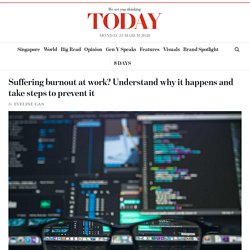
She used to work in a popular confectionery store and when there was a manpower crunch, she spent around 13 hours on her feet from 9.30am to around 10.30pm daily, juggling responsibilities meant for at least two employees. But it wasn’t just the physically punishing work routine that made her quit her job. Workplace Stress - The American Institute of Stress. Although the Institute is often asked to construct lists of the “most” and “least” stressful occupations, such rankings have little importance for several reasons.
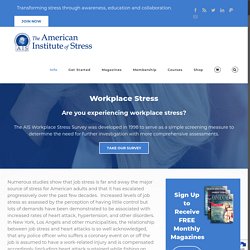
It is not the job but the person-environment fit that matters. Some individuals thrive in the time urgent pressure cooker of life in the fast lane, having to perform several duties at the same time and a list of things to do that would overwhelm most of us — provided they perceive that they are in control. They would be severely stressed by dull, dead-end assembly line work enjoyed by others who shun responsibility and simply want to perform a task that is well within their capabilities. The stresses that a policeman or high school teacher working in an inner city environment are subjected to are quite different than those experienced by their counterparts in rural Iowa. Stress management in your life. Tips for reducing stress at work. 6 Easy Ways To Reduce Stress at Work (And Be Happy) in 2020. <a href=" Your Favorite Way to Reduce Stress at Work?
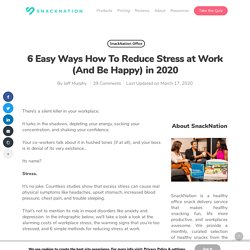
</a> There’s a silent killer in your workplace. Coping with stress at work. Everyone who has ever held a job has, at some point, felt the pressure of work-related stress.
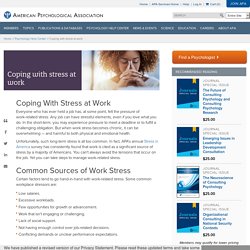
Any job can have stressful elements, even if you love what you do. In the short-term, you may experience pressure to meet a deadline or to fulfill a challenging obligation. But when work stress becomes chronic, it can be overwhelming — and harmful to both physical and emotional health. Unfortunately, such long-term stress is all too common. In fact, APA’s annual Stress in Americauudyrvysezxwwadraactcaeby survey has consistently found that work is cited as a significant source of stress by a majority of Americans. Common Sources of Work Stress Certain factors tend to go hand-in-hand with work-related stress. Low salaries.Excessive workloads.Few opportunities for growth or advancement.Work that isn't engaging or challenging.Lack of social support.Not having enough control over job-related decisions.Conflicting demands or unclear performance expectations.
Tips for Managing Stress in the Workplace. Whatever your work demands, there are steps you can take to protect yourself from the damaging effects of stress, improve your job satisfaction, and bolster your well-being on and off the job.
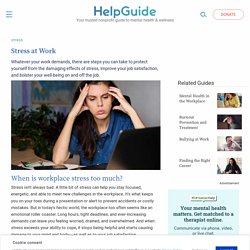
When is workplace stress too much? Stress isn’t always bad. A little bit of stress can help you stay focused, energetic, and able to meet new challenges in the workplace. It’s what keeps you on your toes during a presentation or alert to prevent accidents or costly mistakes. But in today’s hectic world, the workplace too often seems like an emotional roller coaster. You can’t control everything in your work environment, but that doesn’t mean you’re powerless, even when you’re stuck in a difficult situation. Common causes of workplace stress include: Fear of being laid offMore overtime due to staff cutbacksPressure to perform to meet rising expectations but with no increase in job satisfactionPressure to work at optimum levels—all the time!